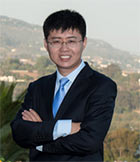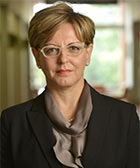Jun
04

Date: 4 June 2024
Time: 8:30 AM ET (New York Time)
Presenter(s): Dr. Shunqiao Sun, Dr. Athina P. Petropulu, Dr. H. Vincent Poor
Based on the IEEE Xplore® article:
MIMO Radar for Advanced Driver-Assistance Systems and Autonomous Driving: Advantages and Challenges” published in the IEEE Signal Processing Magazine, July 2020.
Original article: Download article
Original article publicly available for download on the day of the webinar for 48 hours.
Abstract
Millimeter wave automotive radars are highly reliable in all-weather environments and are indispensable for autonomous vehicles. Our presentation begins with a review of the history of automotive radars for active safety functionalities. As our presenters explore the substantial impact of automotive radar over the past years, they highlight recent advancements that continue to push the boundaries of what’s possible in automotive radar technology for fully autonomous driving. Key topics include the design of radar waveforms, sparse arrays synthesized with multi-input and multi-output (MIMO) radar technology for enhanced angular resolution, high-resolution direction-of-arrival (DOA) estimation with a single snapshot. The presenters then address the challenges encountered when applying MIMO radar theories to automotive contexts, including automotive radar mutual interference and multipath issues. Furthermore, they'll examine forward-thinking innovative research directions such as model-based deep neural networks for high-resolution DOA estimation, the integration of automotive radar sensing and communications, enhanced collaborative sensing via multiple automotive radars, new spectrum opportunities for automotive radars, and the transformative role of deep neural networks in radar perception for autonomous vehicles.
Biography

Shunqiao Sun received the Ph.D. degree in electrical and computer engineering from Rutgers, The State University of New Jersey, New Brunswick, NJ, USA, in January 2016.
He is currently a tenure-track Assistant Professor, after joining the Department of Electrical and Computer Engineering, at the University of Alabama, Tuscaloosa, AL, USA. in August 2019. From 2016-2019, he was with the radar core team of Aptiv, Technical Center Malibu, California, where he has worked on advanced radar signal processing and machine learning algorithms for self-driving vehicles and lead the development of direction-of-arrival estimation techniques for next-generation short-range radar sensor which has been used in over 120-million automotive radar units. His research interests lie at the interface of statistical and sparse signal processing with mathematical optimizations, automotive radar, MIMO radar, machine learning, and smart sensing for autonomous vehicles.
Dr. Sun has been awarded 2016 IEEE Aerospace and Electronics Systems Society (AESS) Robert T. Hill Best Dissertation Award for his thesis “MIMO radar with Sparse Sensing”. He authored a paper that won the Best Student Paper Award at 2020 IEEE Sensor Array and Multichannel Signal Processing Workshop (SAM). He received the U.S. National Science Foundation (NSF) CAREER Award (2024) and CRII Award (2022). He is an elected member of IEEE Sensor Array and Multichannel (SAM) Technical Committee (2024-2026). He is Vice Chair of IEEE Signal Processing Society (SPS) Autonomous Systems Initiative (ASI) Steering Committee (2023-2024). He has co-organized the 1st and 2nd Workshop on Signal Processing for Autonomous Systems (SPAS) at International Conference on Acoustics, Speech, and Signal Processing (ICASSP) 2023 in Rhodes, Greece and ICASSP 2024 in Seoul, Korea, respectively. He has co-organized a dozen special sessions on automotive radar signal processing, machine learning and sparse arrays at IEEE SPS and AESS flagship conferences. He is an Associate Editor of IEEE Signal Processing Letters and IEEE Open Journal of Signal Processing. He is a Senior Member of IEEE.

Athina P. Petropulu (Fellow, IEEE) is currently a Distinguished Professor with the Department of Electrical and Computer Engineering, Rutgers University, New Brunswick, NJ, USA, and was the Chair of the Department during 2010–2016. Prior to joining Rutgers University, she was a professor of electronics and communication engineering with Drexel University, Philadelphia, PA, USA, during 1992–2010. She held Visiting Scholar appointments with SUPELEC, Universite' Paris Sud, Orsay, France, Princeton University, Princeton, NJ, USA, and University of Southern California, Los Angeles, CA, USA.
Her research interests include statistical signal processing, wireless communications, signal processing in networking, physical layer security, and radar signal processing. Her research has been funded by various government industry sponsors, including the National Science Foundation, Office of Naval research, U.S. Army, National Institute of Health, Whitaker Foundation, Lockheed Martin, and Raytheon.
Dr. Petropulu is Fellow of the American Association for the Advancement of Science. She is 2022-2023 President of the IEEE Signal Processing Society and 2020-2021 President-Elect of IEEE SPS. She was the Editor-in-Chief of the IEEE Transactions on Signal Processing during 2009–2011 and the IEEE Signal Processing Society Vice President-Conferences during 2006–2008. She was the General Chair of the 2020 and 2021 IEEE SPS PROGRESS Workshops, the General Co-Chair of the 2018 IEEE International Workshop on Signal Processing Advances in Wireless Communications, Kalamata Greece, and the Genera Chair of the 2005 International Conference on Acoustics Speech and Signal Processing, Philadelphia, PA, USA. She was a Distinguished Lecturer of the Signal Processing Society from 2017 to 2018 and is currently a Distinguished Lecturer of the IEEE Aerospace and Electronics Systems Society. She was the recipient of the 1995 Presidential Faculty Fellow Award given by NSF and the White House, 2012 IEEE Signal Processing Society Meritorious Service Award, and co-recipient of the 2005 IEEE Signal Processing Magazine Best Paper Award, 2020 IEEE Signal Processing Society Young Author Best Paper Award (B. Li), 2021 IEEE Signal Processing Society Young Author Best Paper Award (F. Liu), and 2021 Barry Carlton Best Paper Award by IEEE Aerospace and Electronic Systems Society.

H. Vincent Poor received the Ph.D. degree in EECS from Princeton University in 1977.
He has been on the faculty at Princeton, since 1990, where he is currently the Michael Henry Strater University Professor. From 1977 to 1990, he was on the faculty of the University of Illinois at Urbana–Champaign. From 2006 to 2016, he served as the Dean of the Princeton’s School of Engineering and Applied Science. He has also held visiting appointments with several other universities, including most recently at Berkeley and Cambridge. His research interests are in the areas of information theory, machine learning and network science, and their applications in wireless networks, and energy systems and related fields. Among his publications in these areas is the recent book Machine Learning and Wireless Communications (Cambridge University Press, 2022).
Dr. Poor is a member of the U.S. National Academy of Engineering and the U.S. National Academy of Sciences and a foreign member of the Royal Society and other national and international academies. He received the IEEE Alexander Graham Bell Medal in 2017.
